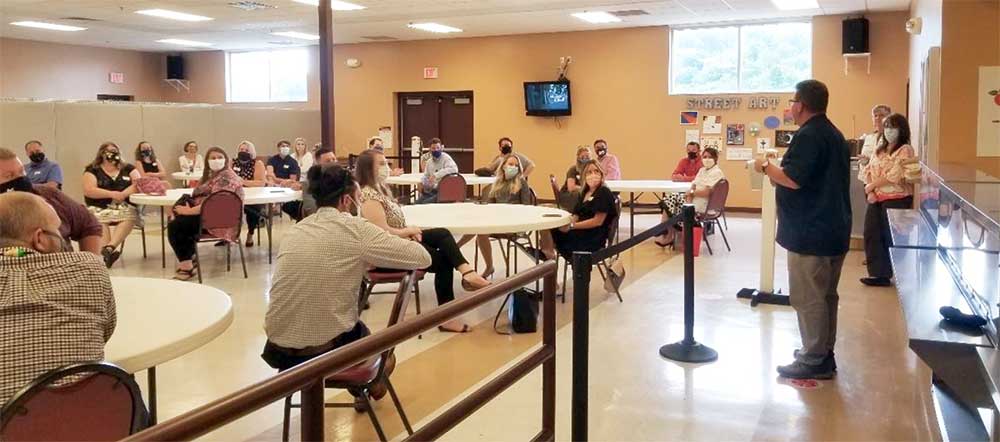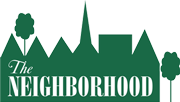
ASHLAND, Ky. — Civic and community leaders from across the Appalachian region of Kentucky came to Ashland to learn about the innovations and processes being developed in Eastern Kentucky to combat poverty nationwide.
BRIGHT Kentucky, which began in 2019, engages bright, entrepreneurial minds from various occupational sectors to offer non-partisan, ethical leadership training, expanded networks, and mentors designed especially for residents of the 54 Kentucky counties of the Appalachian Regional Commission (ARC). The program is made possible by a $500,000 ARC grant and private funding from the Whitaker Foundation, SOAR, and others.
BRIGHT Kentucky is made up of five, three-day sessions where the major focal point is to help participants fully understand the local economic context and to build robust skill sets in communication, collaboration, consensus building, visioning, and community engagement. The program, which runs July through November, will take participants across Eastern Kentucky: Somerset in July, Ashland in August, Berea/Frankfort in September, Pikeville in October, and Hazard in November. The program began in Somerset where the class heard from business leaders, visited Lake Cumberland, and networked with other participants.
This year’s class includes 39 participants from 30 different ARC counties representing a variety of public and private sectors.
Part of this education is to tour and experience those innovative avenues throughout the state, and The Neighborhood is a unique example of such innovation. Being a mixture of old-fashioned charity and business acumen, The Neighborhood provides services that work with a person at every level of need. They provide programs that give access to food and clothing, but they also assist people who need help with college, business advice or those who need chance to hone their artistic skills. They even have experts on educational avenues such as homeschooling and computer programming.
Todd Young, Director of The Neighborhood began the extensive tour in The Ashland Community Kitchen by explaining the philosophy behind The Neighborhood’s structure.
“We walk with people from start to finish, and anywhere in between. We provide various avenues of stability because sometimes you need a hand, but we don’t want to leave you there. Once a person is stable, we give them opportunities for work, education, and growth. And we mentor them all along the way so that they are accountable to someone for what they have been provided. Our battle cry is Stability, Opportunity, and Accountability.”
Working with Mr. Young was his newest staff member, Renee’ Parsons and a representative from Frontier Housing, Nadia Ally. Frontier Housing is a strategic, outside partner of The Neighborhood, a method described by Mrs.
Parsons as “three ways to play” when asked how The Neighborhood works, she stated;
“We have three ways to play if you want to partner with us. The Neighborhood works like a mall of resources. Each agency that comes into the mall is its own entity, with its own board, mission, and director. But each agency coordinates its services with the others so there is not duplication, and the client is better served. There are also programs that are administrated by The Neighborhood itself, like the Employment Initiative Program were people
can learn soft skills or build their own business while really working in what we call a “live work” atmosphere. Those live work avenues are designed around the missions of agencies with whom we are partnered. Finally, we can’t provide everything, so we have strategic partners that are both other charities or for profit businesses who provide everything from hiring opportunities to homeownership, and we can refer clients to these companies sharing both our resources and social capital to assist them in achieving their goals. This allows us to offer services to anyone, no matter what they may be looking for! A true one-stop shop for information and help.”
Nadia Ally from Frontier Housing went on to explain that her company is an important partner because they can provide actual homes for people whether they want to rent or buy, and that their partnership with The Neighborhood is helping them tackle some of the blighted properties in Ashland specifically in order to provide clean, dignified, and affordable homes to people who want to live and work there.
“We can provide financial coaching and budget counseling for those who have never owned a home before, and potential homeowners can even have the opportunity to earn ‘sweat equity’ by building on their own, or a neighbors home through our self help program.”
One BRIGHT participant noted that The Neighborhood truly is an anomaly among the sea of charities a person could support. “It is not often that you see a locally based organization encompass so many avenues of assistance without having some national organization as oversight.” They asked, “Do you think your model is better than existing models?” To which Mrs. Parsons replied with an enthusiastic “Yes!”
Parsons went on to explain, “For years, people have relied on big charitable names to sort out local community issues, and because of that, these companies have developed programs that they replicate in each city nationwide. But Lexington is not like Ashland, and Ashland is not like Nashville, and Nashville is not like Chicago and so on.
These programs are limited in their scope because they have to be reproducible. Plus, when your headquarters in another state are developing processes for you, they won’t always fit right. You have heard the “shop local” mantra? Well people should shop local for their charitable giving as well. A locally based non-profit will be better in touch with the needs of their community, as well as flexible enough to adjust to new issues. Our model allows for local organizations, whose missions are tailored to fit the community they serve, to streamline their services with other local agencies to provide a complete menu of services made for that community, by that community.”
Todd Young went on to say, “Yes, our philosophy is that WE ARE BETTER TOGETHER! And here at The Neighborhood, we have created an adjustable plan that could be adopted by any community. We want to provide a way to ‘cure the patient’, where they don’t need us anymore, and they become the mentor that builds up another person, ultimately building strong communities.”
“The BRIGHT program is a call to action. Effective leadership requires action and is best measured by results. The participants have been challenged to identify various projects to improve their region and exercise ethical leadership and regional collaboration to render success,” said Elmer Whitaker, former Leadership Kentucky Board Chair and BRIGHT Program Visionary and donor. “Given the quality leaders in the program and the growth obtained through BRIGHT, we are certain their actions will have positive results.”
If you would like more information about the BRIGHT Kentucky, visit leadershipky.org.
—Belle Randolph, Freelance
